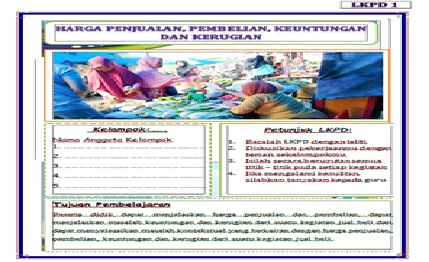
Development of Mathematics Learning Devices by Applying Problem Based Learning to Increase Students Mathematical Solving Skills of Class VII Junior High School
Abstract
Keywords
Full Text:
PDFReferences
Akbar, S. (2013). Instrumen Perangkat Pembelajaran. Bandung: Remaja Rosdakarya.
Ahmad, M., & Asmaidah. S., 2017, Pengembangan Perangkat Pembelajaran Matematika Realistik untuk Membelajarakan Kemampuan Pemecahan Masalah Matematika Siswa SMP. Jurnal Mosharafa, 6(3), 373-384.
Eggen, P., & Kauchak, D., (2012). Strategi dan Model Pembelajaran (Edisi 6). Jakarta: PT. Indiks.
Guswinda, Yuanita, P., & Hutapea, N. M., (2019). Improvement of Mathematical Problem Solving and Disposition Ability of MTs Students through Strategies Think Talk Write in Cooperative Learning in Kuantan Singingi Regency. Journal of Educational Sciences, 3(3), 377-389.
Heleni, S., & Zulkarnain. (2017). Pelaksanaan Kurikulum 2013 pada Bidang Studi Matematika di Sekolah Menengah Pertama Negeri (SMPN) Kota Pekanbaru Tahun Pelajaran 2016/2017. Jurnal Pendidikan Matematika dan Ilmu Pengetahuan Alam, 5(1), 43-54.
Heleni, S., & Zulkarnain. (2018). The Influence of Mathematical Thinking Ability with Modified MOORE Method on Learning Outcomes of Basic Mathematic II Chemical Education Students. Journal of Educational Sciences, 2(2), 33-41.
Nitko, A.J., & Brookhart, S.M., (2011). Educational assesment of student. Boston, MA: Pearson Education, Inc.
Novrini, Siagian, P., & Surya, E., (2015). Pengembangan Perangkat Pembelajaran Berorientasi Problem Based Learning Untuk Meningkatkan Kemampuan Visual Thinking Dalam Pemecahan Masalah Matematis Siswa Kelas VIII SMP. Jurnal Paradigma, 8(3), 84-97.
Nurhayati, F., Widodo, J., & Soesilawati, E.,(2015) Pengembangan LKS Berbasis Problem Based Learning Pokok Bahasan Tahap Pencatatan Akuntasi Perusahaan Jasa. Journal of Economic Education, 4(1), 14-19.
Oktaviani, R. T., & Retnawati, H., (2017). Pengembangan Perangkat Pembelajaran Berbasis Pendekatan Open-Ended Berorientasi Pada Kemampuan Berpikir Kreatis. Jurnal Pendidikan Matematika, 6(8).13– 26.
Peraturan Menteri Pendidikan dan Kebudayaan Nomor 22 Tahun 2016: Standar Proses Pendidikan Dasar dan Menengah. Diakses 25 September 2018.
Putra, A., Syarifuddin, H., & Zulfah. (2018). Validitas Lembar Kerja Peserta Didik Berbasis Penemuan Terbimbing dalam Upaya Meningkatkan Pemahaman Konsep dan Penalaran Matematis. Jurnal Riset Pendidikan Matematika, 1(2), 56 -62.
Rianti, R., Saragih, S. & Zulkarnain. (2020). Development of Mathematics Learning Tools in the Context of Riau Malay Culture to Improve Students' Mathematical Problem Solving Ability. Journal of Educational Sciences, 4(1), 73-82.
Rochmad. (2012). Desain Model Pengembangan Perangkat Pembelajaran Matematika, Jurnal Kreano, 3(1), 59-72.
Roliza, E., Ramadhona, R., & Rosmery, L., (2018). Praktikalitas Lembar Kerja Siswa pada pembelajaran Matematika Materi Statistika. Jurnal Gantang, 3(1), 41 – 46.
Sari, S. M., Johar, R., & Hajidin. (2016). Pengembangan Perangkat Problem Based Learning (PBL) dalam Pembelajaran Matematika di SMA, Jurnal Didaktik Matematika, 3(2), 42-53.
Siswanto, Hudiono, B., & Satria, D. A. B., (2013). Tahapan Penyelesaian Soal Aritmetika Sosial Ditinjau Tahapan O’Neil Berdasarkan Tingkat Kemampuan Siswa SMP. Jurnal Program Studi Pendidikan Matematika FKIP Untan. Pontianak.
Suharti, A., (2013). Improvement of Power Mathematical in Learning Math through Learning Model Combined. International Journal of Science and Technology, 2(8), 576-582.
Vikriyah, N. (2015). Peningkatan Kemampuan Pemecahan Masalah Matematika melalui Model Problem Based Learning pada Pokok Bahasan Trigonometri.
Yunita, S., Andriani. L., & Irma, A., (2018). Pengaruh Penerapan Model Pembelajaran Kooperatif Tipe Group Investigation terhadap Kemampuan pemecahan Masalah matematis ditinjau dari Motivasi Belajar Siswa Sekolah menengah Pertama di Kampar. Journal For Research in Mathematics Learning, 1(1), 11-18.
DOI: http://dx.doi.org/10.31258/jes.4.2.p.368-379
Refbacks
- There are currently no refbacks.
Copyright (c) 2020 Rahmi Fitria, Nahor Murani Hutapea, H. Zulkarnain H. Zulkarnain

This work is licensed under a Creative Commons Attribution 4.0 International License.
Publisher: FKIP Universitas Riau












